Commercial HVAC Water Orton
Find the best Commercial HVAC in Water Orton
Get 3 FREE Business HVAC quotes for your project today! Compare profiles, reviews, accreditations, portfolio, etc... and choose the best offer.

Assist Heat
4.33 reviews66 Norman Ave, Nuneaton, CV11 5NY, GBAssist Heat – Emergency Plumber – Nuneaton is a family run plumbing business, providing Nuneaton area with a friendly professional service for all your plumbing and boiler repair requirements. Our 24 hour emergency plumber colchester. With locally based engineers covering these areas, Assist Heat – Emergency Plumber – Nuneaton specialize in all types of Plumbing services including Emergency Plumbing call outs, Boiler Repair, Boiler installation, Boiler servicing and full heating installations. Assist Heat – Emergency Plumber – Nuneaton pride ourselves as being one of the area’s premier 24 hour emergency Plumbing companies. When a problem occurs that requires an immediate response we offer complete solutions including Boiler repairs and waterleak repairs throughout Nuneaton 24 hours a day, 365 days a year. Highly skilled local Plumbers are on standby with fully equipped vans containing all the necessary equipment to carry out any Plumbing service. With our local Nuneaton engineers you know you’re in safe hands. We have had many recommendations through word of mouth. This is due to our policy of putting customer satisfaction as well as safety, above all else. Please contact one of are friendly office staff now to book a appointment.
- Services
- Why Us?
- Accreditations
- Gallery
Get Quote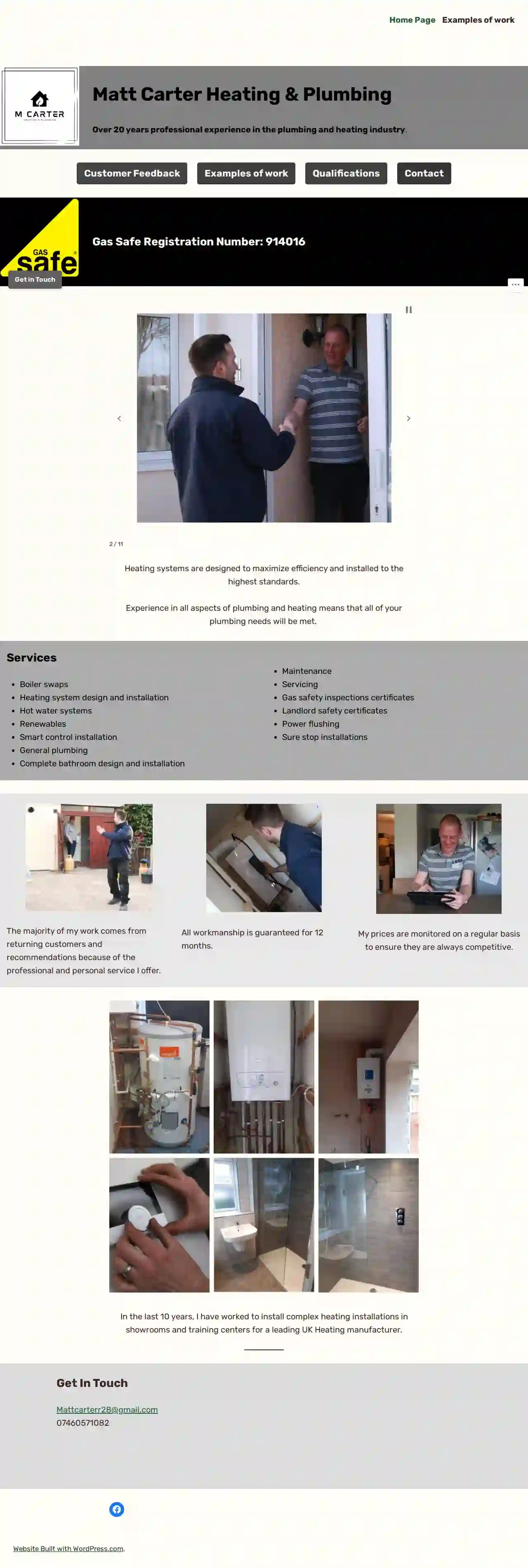
M Carter Heating and Plumbing Ltd
551 reviewsWarwick, GBOver 20 years professional experience in the plumbing and heating industry. Heating systems are designed to maximize efficiency and installed to the highest standards. Experience in all aspects of plumbing and heating means that all of your plumbing needs will be met.
- Services
- Why Us?
- Our Team
- Gallery
Get Quote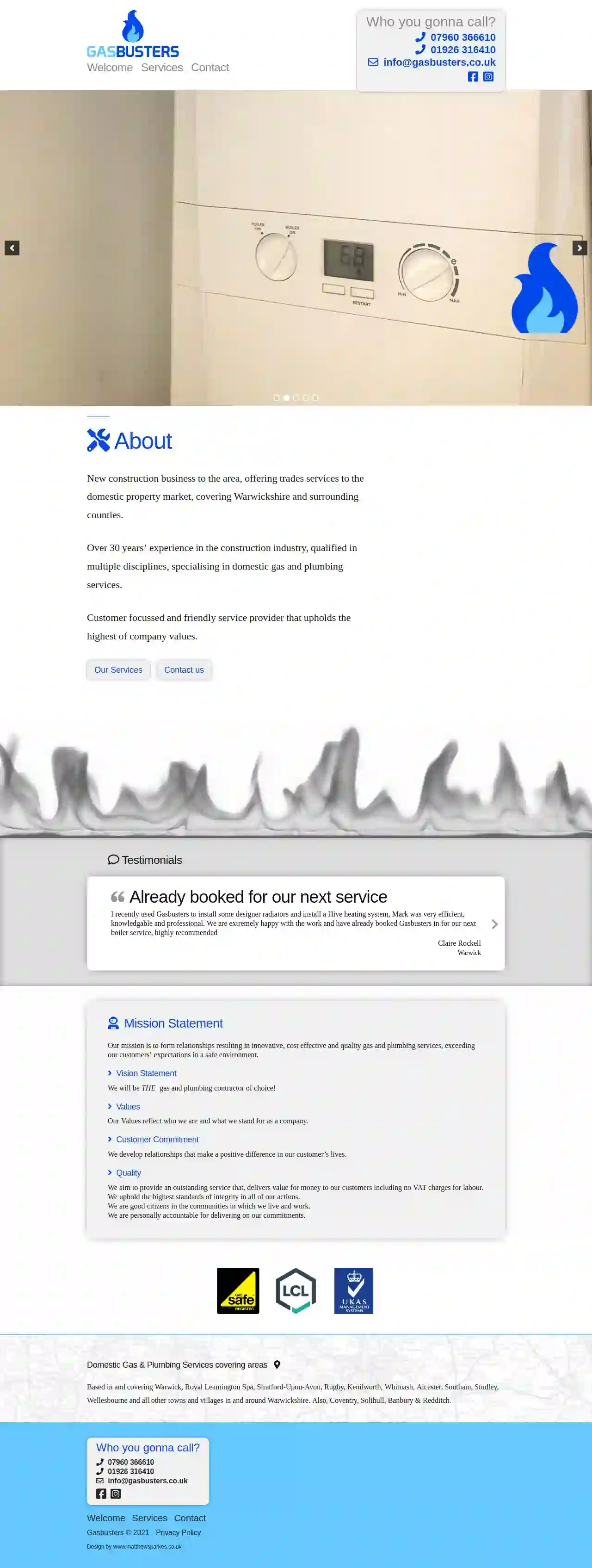
Gasbusters
Unit 1, Warwick Business Centre, Warwick, CV34 6AA, GBNew construction business to the area, offering trades services to the domestic property market, covering Warwickshire and surrounding counties. Over 30 years’ experience in the construction industry, qualified in multiple disciplines, specialising in domestic gas and plumbing services. Customer focussed and friendly service provider that upholds the highest of company values.
- Services
- Why Us?
- Our Team
- Testimonials
- Gallery
Get Quote
Stuart Chalmers Gas & Heating
4.843 reviews16 Ridgewood Close, Royal Leamington Spa, CV32 6BW, GBI am proud to provide customers with a full range of high quality boiler installation and maintenance services. Excellent customer service from an engineer you can trust. The business is lead by Stuart Chalmers who has 15 years experience in dealing with a full variety of gas and heating systems having trained with British Gas. Stuart has always been focused on providing outstanding customer care and works only to the highest standards. Stuart Chalmers Gas & Heating provides a reliable and trustworthy service to clients undertaking jobs of all types. BOILER REPLACEMENT I've fitted countless boilers over the years. If you chose to work with me, I will always do the job correctly, without cutting corners, which saves you money in the long run. BOILER SERVICING This is all about keeping you and your family safe. I will check your boiler for safety and that it’s all operating as it should be, keeping you warm when you need it most. BOILER MAINTENANCE As a former British Gas Engineer, I am highly trained as a breakdown engineer meaning I am able to test components and diagnose where the problem lies. GAS SAFETY CHECKS I am Gas Safe registered and qualified to work on Natural Gas and LPG, Boilers, Cookers, Fires and Warm Air Units. Stuart Chalmers Gas & Heating Engineer I trained with British Gas and have over 15 years of relevant and varied industry experience, working with a full range of systems and installations for both domestic applications. As a registered Gas Safe engineer, I'm qualified to install and sign off installations and maintenance jobs to a high level of safety. I pride myself on the high levels of integrity and customer service that my business is founded on. Check out my recent reviews to see what my customers have to say...
- Services
- Why Us?
- Accreditations
- Our Team
- Testimonials
- Gallery
Get Quote
Maple Air Conditioning and Heat Pumps LLC
515 reviewsWarwick, GBMaple Air Conditioning and Heat Pumps LLC is lead by fully-certified professionals, we are ready to tackle anything from the most complex and large scale construction projects to the smallest of repair jobs. I’m fueled by my commitment to excellence and go the extra mile to make sure my clients are completely satisfied with my work. Call to schedule an initial consultation today.
- Services
- Why Us?
- Our Team
- Gallery
Get Quote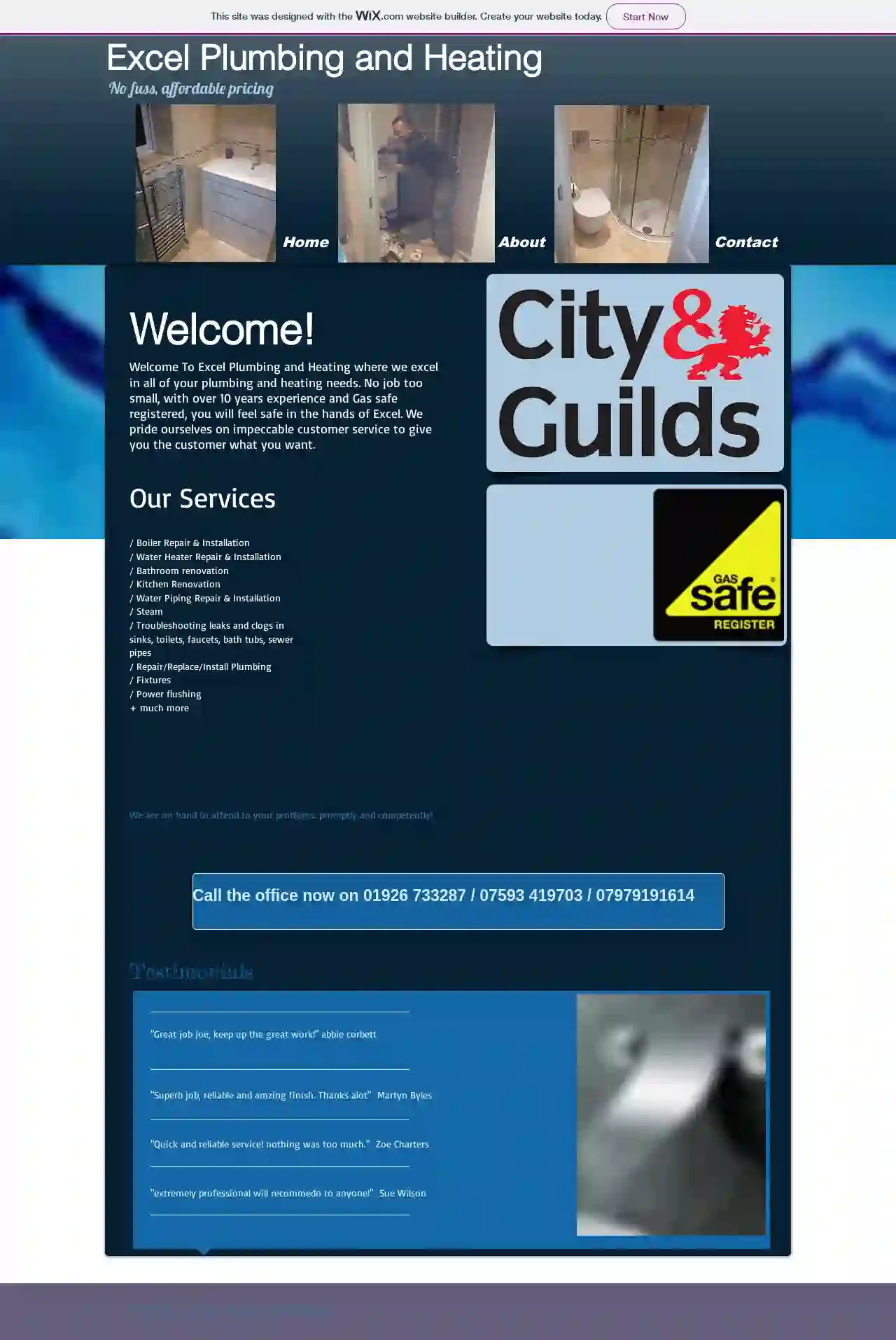
Excel Plumbing & Heating
11 reviewsLeamington Spa, CV32, GBWelcome To Excel Plumbing and Heating where we excel in all of your plumbing and heating needs. No job too small, with over 10 years experience and Gas safe registered, you will feel safe in the hands of Excel. We pride ourselves on impeccable customer service to give you the customer what you want.
- Services
- Why Us?
- Testimonials
- Gallery
Get Quote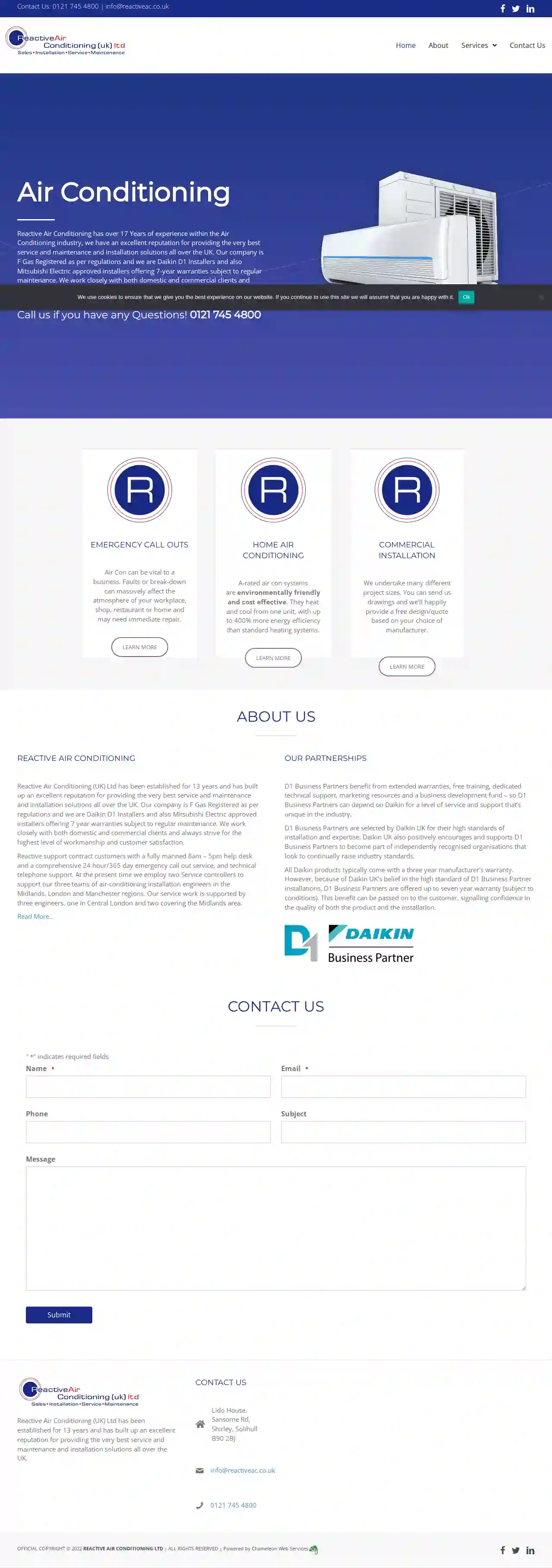
Reactive Air Conditioning (UK) Ltd
51 reviewsSansome Rd, Shirley, Lido House, Solihull, B90 2BJ, GBReactive Air Conditioning (UK) Ltd has been established for 13 years and has built up an excellent reputation for providing the very best service and maintenance and installation solutions all over the UK. Our company is F Gas Registered as per regulations and we are Daikin D1 Installers and also Mitsubishi Electric approved installers offering 7 year warranties subject to regular maintenance. We work closely with both domestic and commercial clients and always strive for the highest level of workmanship and customer satisfaction.Reactive support contract customers with a fully manned 8am – 5pm help desk and a comprehensive 24 hour/365 day emergency call out service, and technical telephone support. At the present time we employ two Service controllers to support our three teams of air-conditioning installation engineers in the Midlands, London and Manchester regions. Our service work is supported by three engineers, one in Central London and two covering the Midlands area.
- Services
- Why Us?
- Accreditations
- Gallery
Get Quote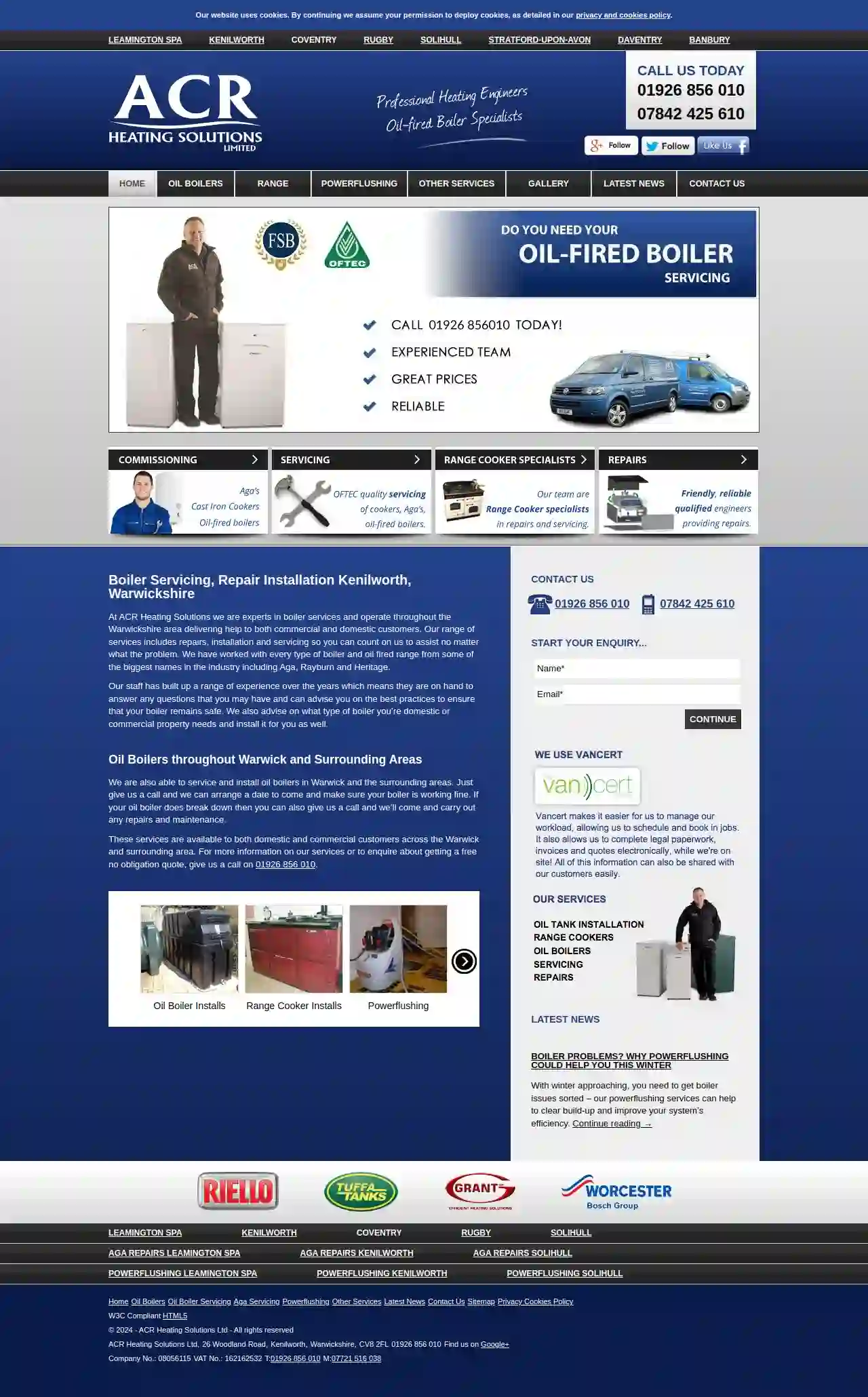
A C R Heating Services
3.58 reviews26 Woodland Road, Kenilworth, CV8 2FL, GBAt ACR Heating Solutions we are experts in boiler services and operate throughout the Warwickshire area delivering help to both commercial and domestic customers. Our range of services includes repairs, installation and servicing so you can count on us to assist no matter what the problem. We have worked with every type of boiler and oil fired range from some of the biggest names in the industry including Aga, Rayburn and Heritage. Our staff has built up a range of experience over the years which means they are on hand to answer any questions that you may have and can advise you on the best practices to ensure that your boiler remains safe. We also advise on what type of boiler you’re domestic or commercial property needs and install it for you as well. We are also able to service and install oil boilers in Warwick and the surrounding areas. Just give us a call and we can arrange a date to come and make sure your boiler is working fine. If your oil boiler does break down then you can also give us a call and we’ll come and carry out any repairs and maintenance. These services are available to both domestic and commercial customers across the Warwick and surrounding area. For more information on our services or to enquire about getting a free no obligation quote, give us a call on 01926 856 010.
- Services
- Why Us?
- Accreditations
- Gallery
Get Quote
Klimatec
32 reviewsWarwick, Warwickshire, 2 Lammas Centre, Budbrooke Industrial Estate, CV34 5WQ, GBKlimatec Limited, established on 1 June 2004, is a leading provider of engineering support services throughout the UK. With over 250 years of combined experience in our management team, we specialize in delivering air conditioning solutions to a diverse range of organizations, including data centres, hospitals, banks, government institutions, pharmaceutical companies, and manufacturers. We pride ourselves on providing bespoke engineered solutions tailored to meet the unique needs of each client. Safety is paramount to our operations, as evidenced by our annual RoSPA Gold Awards and ISO 45001 accreditation. We are committed to creating a safe working environment for our engineers, customers, and anyone else who may be affected by our work. Our technical expertise, dedication to health & safety, customer care, and first-class service delivery ensure that we consistently exceed our clients' expectations.
- Services
- Why Us?
- Accreditations
- Gallery
Get Quote
Indoor Climate Systems (UK) Ltd
New Road, Office 8, Malvern House, Solihull, B91 3DL, GBIndoor Climate Systems (ICS) is a leading UK mechanical services provider, specializing in creating controlled environments for commercial and industrial sectors. Established in 1992, ICS is privately owned and run by engineers, emphasizing project delivery and quality engineering expertise. The company boasts preferred contractor status with numerous clients and a high rate of repeat business, a testament to their performance. ICS takes pride in its team of highly qualified design engineers with over 100 years of combined onsite project management experience. ICS is certified in ISO9001 and ISO14001 and is a member of Constructionline. Their commitment to client satisfaction is evident in their 'TAKE TIME' initiative, a tailor-made plan ensuring snag-free, defect-free, on-time project completion. This involves meticulous design checks, proactive site snag management, dedicated commissioning managers, and comprehensive O&M manuals. ICS offers a comprehensive range of services, including design, build, specification, and drawings, utilizing the latest technologies like BIM, Revit, and AutoCAD 3D. They excel in project management, installation, and coordination with existing services and other trades, ensuring seamless integration. Detailed site surveys are conducted at the project's outset to guarantee accuracy in their drawings. ICS builds long-lasting relationships with clients and consultants based on high-quality service, a professional environment, and exceptional installations.
- Services
- Why Us?
- Accreditations
- Gallery
Get Quote
Over 12,692+ HVAC Contractors on our platform
Our HVAC contractors operate in Water Orton and surrounding areas!
HVACCompaniesHub has curated and vetted the Best HVAC Companies in and around Water Orton. Find a trustworthy pro today.
Frequently Asked Questions about Commercial HVAC
- Building Size and Type: Larger or specialized buildings (restaurants, labs) have more complex requirements.
- System Type and Capacity: Different HVAC systems (e.g., rooftop units, VRF systems) have varying costs.
- Efficiency: Higher-efficiency units typically have a higher initial cost.
- Installation Complexity: Ductwork, electrical wiring, and other installation factors influence the final price.
- Location: Labor costs and local regulations can affect pricing.
- Size and Capacity: Commercial HVAC systems are usually much larger than residential systems to handle greater heating and cooling demands of bigger spaces.
- Complexity: Commercial HVAC systems are more complex, often using multiple units, zones, and advanced controls.
- Ductwork: Commercial ductwork is typically more extensive and complex than residential ductwork.
- Refrigerant: Commercial systems may use different types of refrigerant than those used in residential systems.
- Maintenance Requirements: Regular maintenance is essential for both types of systems, but commercial systems typically require more frequent and specialized maintenance.
- Cost: Commercial HVAC installation and maintenance costs are generally higher than residential due to system complexity and specialized labor required.
How much does a commercial HVAC system cost?
How is commercial HVAC different from residential HVAC?
Why is indoor air quality (IAQ) important for my business?
What is an Air Handling Unit (AHU)?
How much does a commercial HVAC system cost?
- Building Size and Type: Larger or specialized buildings (restaurants, labs) have more complex requirements.
- System Type and Capacity: Different HVAC systems (e.g., rooftop units, VRF systems) have varying costs.
- Efficiency: Higher-efficiency units typically have a higher initial cost.
- Installation Complexity: Ductwork, electrical wiring, and other installation factors influence the final price.
- Location: Labor costs and local regulations can affect pricing.
How is commercial HVAC different from residential HVAC?
- Size and Capacity: Commercial HVAC systems are usually much larger than residential systems to handle greater heating and cooling demands of bigger spaces.
- Complexity: Commercial HVAC systems are more complex, often using multiple units, zones, and advanced controls.
- Ductwork: Commercial ductwork is typically more extensive and complex than residential ductwork.
- Refrigerant: Commercial systems may use different types of refrigerant than those used in residential systems.
- Maintenance Requirements: Regular maintenance is essential for both types of systems, but commercial systems typically require more frequent and specialized maintenance.
- Cost: Commercial HVAC installation and maintenance costs are generally higher than residential due to system complexity and specialized labor required.